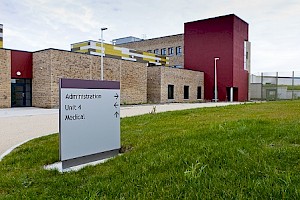Youth Justice
Ireland has a long history of poor responses to offending behaviour by children. A core strand to IPRT's work since its establishment in 1994 has been the promotion of a more effective youth justice system, with emphasis on non-custodial alternatives, diversion, early intervention and prevention strategies and programmes. Central to our work was ending the practice of detaining children in adult prisons, which was in breach of international human rights standards and a serious stain on Ireland's human rights record.
International human rights standards, and in particular the provisions of the UN Convention on the Rights of the Child, are clear that custody for children should only be used as a last resort and for the minimum required period of time. All efforts should be made to apply alternatives to detention to ensure that such a measure is only used in exceptional circumstances.
In Ireland, the Children Act 2001 recognizes the principle of detention as a last resort. The Act prohibits the imprisonment of children and the Criminal Justice Act 2006 makes provision for all children less than 18 years of age to be detained in Children Detention Schools. The detention school model is focused on a model of care, education, health and programmes that address offending, with improved outcomes for the young people, their communities and all of society. The Irish Youth Justice Service is responsible for the Children Detention Schools, within the Department of Children and Youth Affairs.
Following years of sustained advocacy by IPRT, along with many national and international bodies, in 2012 the detention of boys aged under 17 at St Patrick's Institution ended. In March 2017, a Ministerial Order ended the sentencing of children aged under 18 to adult prison in Ireland, and in April 2017, St. Patrick’s Institution was finally closed. Since September 2017 boys aged under 18 are no longer detained in the adult prison system.
IPRT continues to work towards progressive change in youth justice policies and practice, as well as engaging with wider policy and practice issues relating to youth justice, such as the provision of alternatives to detention, diversion and early intervention programmes.

UK: Professional Dance Training for Young Offenders
24th February 2010
UK project 'Dance United' sees reduction in reoffending rates for those young people participating.
Guardian: Where's the victim support for troubled perpetrators?
17th February 2010
A Guardian article highlights the familiar story that many young offenders are themselves victims.
Guardian: Young offenders making amends through community reparation
17th February 2010
Members of the public in the the north west of England have suggested projects that young offenders can do to make up for their misdemeanors.
The Irish Times: Youth Crime
1st February 2010
At last, measures to supervise and rehabilitate troubled juveniles within their own communities and keep them out of prison are having a measurable effect.
NY Times: 'City Signals Intent to Put Fewer Teenagers in Jail'
20th January 2010
The mayor's office has announced plans to merge the city’s Department of Juvenile Justice into its child welfare agency. This signals a "more therapeutic approach toward delinquency" that will see fewer young offenders sent to prison.
NYCI: Working With Young People Involved in the Juvenile Justice System
14th December 2009
A useful resource created for those working with children, with special attention given to those children in conflict with the law.
UK: 'Healthy Children, Safer Communities'
8th December 2009
A new cross-government strategy to promote the health and well-being of children and young people in contact with the youth justice system.
U R Boss: new youth justice project from Howard League
3rd December 2009
U R Boss is a ground breaking youth justice project in the UK that provides an enhanced legal service shaped by and for young people in custody and those recently released into the community.

Launch of IPRT report on Detention of Children
30th November 2009
IPRT launched a new research report, 'Detention of Children in Ireland: International Standards and Best Practice' on 30th November 2009 at Pearse Street Library, Dublin 2.
Ireland's Youth Justice in Action Solidarity Day: June 2009
20th November 2009
Ireland's Youth Justice in Action Solidarity Day took place 17th June 2009. As part of their activities, the Minister for Justice, Equality and Law Reform was questioned on the continuing detention of 16 year olds in St Patrick's Institution.




